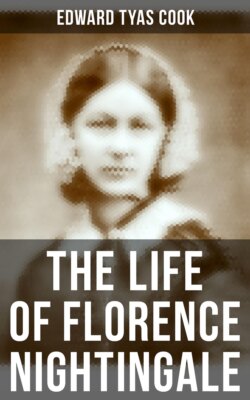Читать книгу The Life of Florence Nightingale - Edward Tyas Cook - Страница 32
На сайте Литреса книга снята с продажи.
V
ОглавлениеIn the autumn of 1848 an opportunity occurred which promised the realization of the dearest wish of her heart, but once more she was doomed to disappointment. Her mother and sister had been advised to go to Carlsbad for the cure. M. and Madame Mohl were to be at Frankfurt, and they were all to meet in that city. Frankfurt is near to Kaiserswerth, and Florence was to be allowed to go there. But at the very moment disturbances broke out in Frankfurt, and the whole plan was abandoned. “I am not going to consign to paper for your benefit,” she wrote to Madame Mohl (October 1848), “all the cursings and swearings which relieved my disappointed feelings; for oh! what a plan of plans I had made out for myself! All that I most wanted to do at Kaiserswerth, Brussels, and Co., lay for the first time within reach of my mouth, and the ripe plum has dropped.” Florence accompanied her mother to the cure at Malvern instead, where, with many prayers for humility under the will of God, she lived for several weeks upon the dry and bitter fruit of disappointment. During the winter of 1848–49 Miss Nightingale saw something of M. Guizot and his family. The Minister had escaped to London after the fall of Louis Philippe, and was living in a modest house in Brompton. He found in Miss Nightingale “a brave and sympathetic soul, for whom great thoughts and great devotions had a serious attraction.”44
During the next year she found some congenial work in London. She inspected hospitals. She worked in Ragged Schools. She spoke of her “little thieves at Westminster” as her “greatest joy in London.” But these unconventional attractions of the London season set her all the more against the life of country houses. “Ought not one's externals,” she wrote in her diary (July 2, 1849), “to be as nearly as possible an incarnation of what life really is? Life is not a green pasture and a still water, as our homes make it. Life is to some a forty days' fasting, moral or physical, in the wilderness; to some it is a fainting under the carrying of the crop; to some it is a crucifixion; to all, a struggle for truth, for safety. Life is seen in a much truer form in London than in the country. In an English country place everything that is painful is so carefully removed out of sight, behind those fine trees, to a village three miles off. In London, at all events if you open your eyes, you cannot help seeing in the next street that life is not as it has been made to you. You cannot get out of a carriage at a party without seeing what is in the faces making the lane on either side, and without feeling tempted to rush back and say, ‘Those are my brothers and sisters.’ ” She longed to rush back, to be able to go out freely into the slums, to comfort some old woman who was dying unattended, or rescue some child who was going astray untaught. But the proprieties prevented. “It would never do,” she was told, “for a young woman in her station in life to go out in London without a servant.” In the autumn of 1849 the distraction of another foreign tour was offered. Her parents and her sister hoped once more that Florence would return a different and a more comfortable woman. Those with whom we are cast into the nearest intimacy sometimes understand us least.
